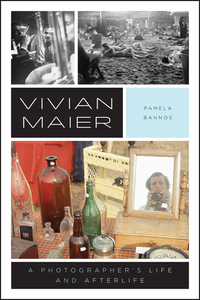You need to sign in or sign up before continuing.
Take a photo of a barcode or cover
informative
slow-paced
I appreciate all the research the author did for this and I found the information presented fascinating but I absolutely loathed the jumps back and forth between Vivian Maier's life and the life of her materials. It made it feel very disjointed and made for a more challenging read than was necessary.
While the first chapter is a bit slow -- it's a look at the family lineage of Vivian Maier which, without a lot of context, is kind of meaningless initially -- everything makes sense as the book continues. Bannos takes what has become a myth about the ultra-talented nanny photographer and explores the true history of Vivian Maier and how her life and photography mirrored the development of the art. This book unravels a lot about Maier which has so conveniently been left off the real story of a woman who was far more interesting in reality than in mythology. More, this story explores how men have profited off the lies they've told and perpetuated. Bannos does tremendous work here, going so far as to find where Maloof had asked in online legal forums what could happen related to copyright and what he hoped to do with the photos he'd bought at the locker auction.
More, this really gives a sense of Maier's depth of love for photography. It wasn't that she was a secret talent. She LOVED doing it and while she was eccentric, it's clear she worked caring for children because it helped her afford a life of travel and photography. There's a really unbelievable piece of this story where Bannos talks about a mega trip that Maier planned to travel through South America....that didn't happen (she traveled across Asia, Africa, and Europe later on) and yet, Maloof had taken, and talked up, to have been a thing that DID happen.
At heart, it's a book about reclaiming Vivian's voice for herself. In the bigger picture, it's a book about how men took away her voice, claimed it for themselves, filled in gaps the way they felt like it, and profited. Finding Vivian Maier has an entirely different taste to it now -- it's much more flat and phony. Maier was far more interesting than the stories that have been told about her.
The photography in here is great, too. I've seen the exhibit at the Chicago History Museum, and now I'm itching to go back and not only see how the story was framed, but also look to see whether what Bannos says about her intimacy with her subjects feels more true (I think it does).
It's an academic text but readers who love photography or the ~mystery~ of Maier will gulp it down. There are nearly 100 pages of endnotes.
More, this really gives a sense of Maier's depth of love for photography. It wasn't that she was a secret talent. She LOVED doing it and while she was eccentric, it's clear she worked caring for children because it helped her afford a life of travel and photography. There's a really unbelievable piece of this story where Bannos talks about a mega trip that Maier planned to travel through South America....that didn't happen (she traveled across Asia, Africa, and Europe later on) and yet, Maloof had taken, and talked up, to have been a thing that DID happen.
At heart, it's a book about reclaiming Vivian's voice for herself. In the bigger picture, it's a book about how men took away her voice, claimed it for themselves, filled in gaps the way they felt like it, and profited. Finding Vivian Maier has an entirely different taste to it now -- it's much more flat and phony. Maier was far more interesting than the stories that have been told about her.
The photography in here is great, too. I've seen the exhibit at the Chicago History Museum, and now I'm itching to go back and not only see how the story was framed, but also look to see whether what Bannos says about her intimacy with her subjects feels more true (I think it does).
It's an academic text but readers who love photography or the ~mystery~ of Maier will gulp it down. There are nearly 100 pages of endnotes.
informative
reflective
slow-paced
I wanted more of Maier's photographs and less about the birth and childhood of her parents. Not Bannos's fault, just not quite what I was looking for.
I did not expect to enjoy this book, but thoroughly did. It took a while for the flips between her history and the present day actors (Maloof, Goldstein, etc.) to grow on me, but it proved to be an effective narrative device. Bannos' approach is very centered, journalistic, and comes from a place of careful research that does not take anything said by the present-day promoters at face value. A great read.
What an interesting book captivated by characters whose motivations are not always altruistic. The author details Vivian Maier's life juxtaposed against the sale of her photography and life's work while giving attention to the history of photography and its equipment. Vivian's work laid bare for public consumption is in stark contrast to her private life and her fierce independence and brings forth a variety of questions, from copy rights to privacy to class and gender.
emotional
informative
mysterious
sad
medium-paced







